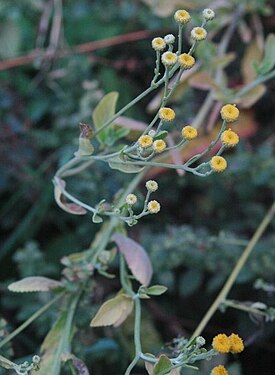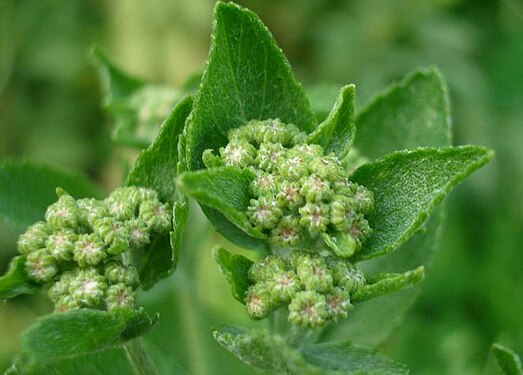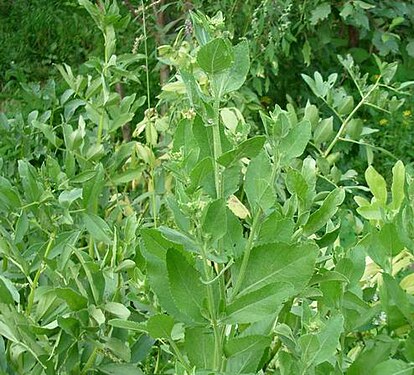Difference between revisions of "Tanacetum balsamita"
From Gardenology.org - Plant Encyclopedia and Gardening Wiki
Jump to navigationJump to search| Line 3: | Line 3: | ||
|genus=Tanacetum | |genus=Tanacetum | ||
|species=balsamita | |species=balsamita | ||
| + | |taxo_author=L. | ||
|common_name=Alecost, Costmary | |common_name=Alecost, Costmary | ||
| + | |habit=herbaceous | ||
|Min ht box=36 | |Min ht box=36 | ||
|Min ht metric=in | |Min ht metric=in | ||
| Line 10: | Line 12: | ||
|lifespan=perennial | |lifespan=perennial | ||
|exposure=sun | |exposure=sun | ||
| + | |features=flowers | ||
|flower_season=early summer, mid summer, late summer, early fall, mid fall, late fall | |flower_season=early summer, mid summer, late summer, early fall, mid fall, late fall | ||
|flowers=white | |flowers=white | ||
| Line 15: | Line 18: | ||
|min_zone=6 | |min_zone=6 | ||
|max_zone=10 | |max_zone=10 | ||
| − | | | + | |image=Tanacetum balsamita cv.majus Kh.208 Habitus.jpg |
| − | + | |image_width=200 | |
| − | |image_width= | ||
}} | }} | ||
| − | + | '''Tanacetum balsamita''' is a perennial temperate herb known as '''Costmary''', '''Alecost''' or '''Balsam herb'''. | |
| − | + | ||
| − | + | It has been grown for many centuries for its pleasant, slightly medicinal or [[balsam|balsamic]] smell. It was used in medieval times as a place marker in [[Bible|bibles]]. It is referred to by Culpeper and others as the 'Balsam Herb'. [http://www.botanical.com/botanical/mgmh/c/costm107.html] | |
| − | + | Leaves of the plant have been found to contain a range of [[essential oil|essential oils]]. | |
| − | + | ||
| − | + | ==Cultivation== | |
| − | + | ||
| − | + | ||
| − | + | ===Propagation=== | |
| − | |||
| − | |||
| − | |||
| − | |||
| − | |||
| − | |||
| − | + | ===Pests and diseases=== | |
| − | |||
| − | |||
| − | + | ==Varieties== | |
| − | |||
| − | |||
| − | == | + | ==Gallery== |
| − | + | <gallery perrow=5> | |
| + | File:Tanacetum balsamita (Natur-species).jpg | ||
| + | File:Tanacetum balsamita HRM.jpg | ||
| + | File:Tanacetum balsamita cv.majus Kh.208 But.jpg | ||
| + | File:Tanacetum balsamita cv.majus Kh.208 Habitus.jpg | ||
| + | </gallery> | ||
==References== | ==References== | ||
| + | <references/> | ||
| + | <!--- xxxxx *Flora: The Gardener's Bible, by Sean Hogan. Global Book Publishing, 2003. ISBN 0881925381 --> | ||
| + | <!--- xxxxx *American Horticultural Society: A-Z Encyclopedia of Garden Plants, by Christopher Brickell, Judith D. Zuk. 1996. ISBN 0789419432 --> | ||
| + | <!--- xxxxx *Sunset National Garden Book. Sunset Books, Inc., 1997. ISBN 0376038608 --> | ||
| − | + | ==External links== | |
| + | *{{wplink}} | ||
| − | + | {{stub}} | |
| + | __NOTOC__ | ||
Revision as of 15:16, 17 April 2010
| Habit | herbaceous
| |
|---|---|---|
| Lifespan: | ⌛ | perennial |
| Bloom: | ❀ | early summer, mid summer, late summer, early fall, mid fall, late fall |
| Exposure: | ☼ | sun |
|---|---|---|
| Features: | ✓ | flowers |
| USDA Zones: | 6 to 10 | |
| Flower features: | ❀ | white |
|
L. > |
Tanacetum balsamita is a perennial temperate herb known as Costmary, Alecost or Balsam herb.
It has been grown for many centuries for its pleasant, slightly medicinal or balsamic smell. It was used in medieval times as a place marker in bibles. It is referred to by Culpeper and others as the 'Balsam Herb'. [1] Leaves of the plant have been found to contain a range of essential oils.
Cultivation
Propagation
Pests and diseases
Varieties
Gallery
References
External links
- w:Tanacetum balsamita. Some of the material on this page may be from Wikipedia, under the Creative Commons license.
- Tanacetum balsamita QR Code (Size 50, 100, 200, 500)




